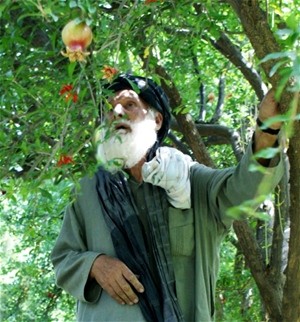
Hajji Baba admires a pomegranate tree in his orchard.
USAID/IRD/AVIPA Plus
A successful orchard management project directly improves safety and security in Arghandab, Kandahar.
“If these types of agricultural projects continue in the future, I assure you that security will get even better in the entire area, since former insurgents and criminals have started working with us as ordinary people do.”—Hajji Baba, an orchard owner from Arghandab
6 JUNE 2010 | KANDAHAR PROVINCE, AFGHANISTAN
As a village elder, Hajji Baba cares about his community and knows that his well-being is linked to the security of his environment and the prosperity of his fellow villagers in Arghandab District of Kandahar Province. Hajji Baba was one of many Arghandab farmers suffering after several years of drought. The farmers couldn’t plow the land, had no fruit on their trees, and didn’t know what to do about the insects.
Addressing these problems, USAID’s Afghanistan Vouchers for Increased Productive Agriculture (AVIPA) Plus project delivered a large-scale sapling project in Kandahar, where laborers planted 814,000 pomegranate, apricot, plum, and grape saplings to rehabilitate more than 6,000 hectares of orchards previously pruned and cleaned by AVIPA Plus laborers.
Like other elders from the villages in southern Afghanistan where this USAID-funded program operates, Hajji Baba heard about AVIPA Plus from his district governor. In the Arghandab District Center, AVIPA Plus personnel asked the elders to provide beneficiary lists for their villages. Soon, formerly unemployed people from his village were pruning and cleaning the orchards using new equipment with newly acquired skills.
“This year is much better. In January, AVIPA Plus provided us with saplings and labor to clean and prune the orchards. The program provided us with an organic spray that doesn’t kill the bees. This year we will have the best harvest in the last 30 years,” said Hajji Baba.
Hajji Baba believes the program’s greatest strength is the opportunity it provides for jobless and landless people. “Unemployment and drug addiction were turning these people against peace and security. Now they work with us,” he said.
He is proud of his orchard where he grows apricots, plums, peaches, walnuts, almonds, pistachios, figs – and, of course, the pomegranates and grapes for which the region is famous.
Hajji Baba’s community is one of the many AVIPA Plus is working with to improve the stability and prosperity in this harsh environment.







Comment
Make a general inquiry or suggest an improvement.